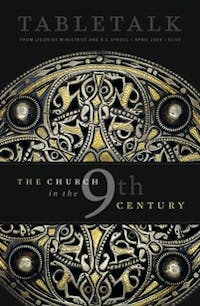
Request your free, three-month trial to Tabletalk magazine. You’ll receive the print issue monthly and gain immediate digital access to decades of archives. This trial is risk-free. No credit card required.
Try Tabletalk NowAlready receive Tabletalk magazine every month?
Verify your email address to gain unlimited access.
There is a tension among the people of God that reflects a delicate balance to which the Bible calls us. Paul, you will recall, argued that in his passion for the gospel, he wished to be all things to all people, that by all means some might be saved (1 Cor. 9:22). On the other hand, Jesus tells the disciples that when they brought the good news and were not received, they were to wipe the dust off of their feet as they left the town (Luke 9:5). They’re both legitimate perspectives on the lost. Where, we wonder, does earnestly contending for lost souls end and pandering to the lost begin?
The worship wars of our own day are driven by this same tension. There is nothing new under the sun. Do we gather together each Lord’s Day to worship the Lord with the most simple language? Should our music aspire for accessibility above all else? Do we want to dumb everything down so that everyone can get it? Is this how we bring in the lost? Or, should our weekly gatherings instead be times of erudite exposition and sublime aural harmonies? Do we, with the former, through our workaday media, communicate a God who is safe? Do we, with the latter — with our highbrow affectations — communicate a God who is inaccessible?
In the ninth century, when the Latin Mass began to be enforced, I’m confident the same discussions took place. Some, I would expect, argued that the Latin Mass carried with it a gravity that communicated the glory of God, a certain sense of mystery and timelessness. Others, I’m quite sure, pointed out that the people for whom Jesus died could not understand what was being said. How can we say that this body was broken for you if you don’t know what we’re saying?
The Bible is a book that not only is full of wisdom but that in turn calls us to wisdom. Wisdom, more often than not, means balance. Wisdom recognizes that there is a real difference between prudent accessibility and the lowest common denominator. Wisdom can tell the difference between a foreign language and a challenging language. It is able to distinguish between self-serving, highbrow tastes and treating matters of import with all due dignity. It recognizes, for instance, that there is a great yawning space between a pastor preaching in a long dead language and a pastor preaching in a clown suit.
As is so often the case, wisdom is often found when we look away from the question at hand, when we step away from the raging debate and look instead to where we agree. When we gather together for worship, we are gathering together, according to the Bible, as a body. We are likewise gathering together as a bride. We are coming to meet our Lord, who comes to renew covenant with us and to feast with us at His table. Now consider how we approach a wedding.
When we come together for a wedding, no one would suggest that for the sake of the dignity of the event we ought to perform the service in Latin. No one would argue that the pastor’s homily ought to be peppered with obtuse language fit only for the seminary classroom. Neither, however, does any bride dream of a day when a man in stained overalls, smelling of a barnyard, looks down at her and asks her the vows: “Well, do yer or don’t yer?” Instead, when we marry we put on our best clothes. We decorate the setting to befit a time of solemnity and joy. We play our best music. We speak in our most gracious tones, and with our most polished grammar. It is our most important “our.” Nobody, I trust, argues that this leaves people out. No one argues that this is somehow inauthentic. No bride would, if her groom showed up in flip-flops and a t-shirt, argue that she sees the heart and that what’s on the outside doesn’t matter. That is, the wedding ceremony is not to be marked by the world’s best and highest, but by our best and our highest. It is our most important “our.”
Our worship should bring us together, rather than drive us apart. We have, after all, together been called to worship by our Lord. That is why we use at one and the same time a common language in an uncommon way. We speak so that the gravity of the message might be heard. We are not pandering to anyone, and we rejoice in an audience of One. We play music that can reach the hearts of the congregation in a way far more powerful than silly love songs ever could, seeking to reflect the heavenly chorus.
When we come to worship we come in ourselves still unclean. We as a bride are too besmirched and stained to feign haughtiness. We are too conscious of our own sin to be looking down our noses at others. But we come seeking to be made beautiful, confident that our Groom can bring this to pass. We have given up the world, with all its arrogant slovenliness. We have turned up our noses at the world’s studied indifference to beauty. We do indeed speak English, but it is not the English of the court fool. It is the King’s English.
